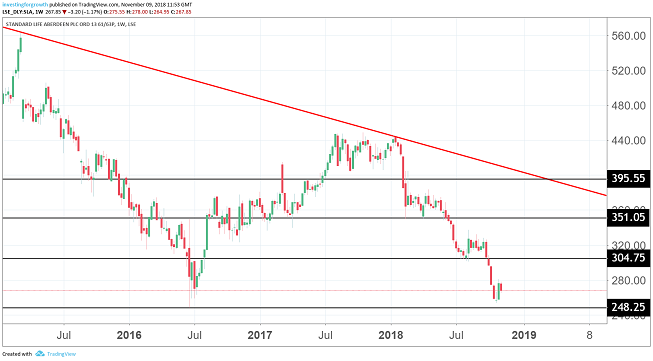Stockwatch: CEO buys into this 9% yield
9th November 2018 12:03
by Edmond Jackson from interactive investor
This sector has been hit hard in recent months, but could enjoy a re-rating, argues companies analyst Edmond Jackson. Top brass also appear confident in the generous dividend.

Is it time for contrarian investors to consider the insurance sector? Most stocks have been in a bear market from last springtime amid fears of Brexit and an Italian bond crisis – such that yields have typically edged over 6%.
Direct Line offers about 7.5% at a current share price around 320p, although investors are quite likely wary about how general insurance such as motor and home is a commodity item.
Moreover, at end-October the Financial Conduct Authority launched an investigation into this area looking at firms' conduct, pricing practices and fair pricing.
Co-chief executive buys £811,170 worth of equity
Standard Life Aberdeen is the one currently sticking out with a fall of over 40% this year to about 267p currently, presenting a whopping 9% prospective yield if 2019 projections are fair.
Given earnings cover has settled around 1.1 times and 1.4 for 2019, depending on consensus for 27% earnings growth, it’s hardly surprising enough investors are sidelined.
The likely sense is a dividend cut triggering further downside, yet at end-October Keith Skeoch, one of the group's chief executives, saw fit to buy two lots of 150,000 shares at 269.12p and 271.66p which not surprisingly has propped market price for now.
That implies, even in a worse-case scenario of forecasts not meeting hopes, he sees plenty of intrinsic value to exploit now. As a previous chief economist then managing director of international equities at the stockbroker James Capel in the 1980s and 1990s, he should know equity valuation and has spent three years as Standard's CEO, so should know the business.

Source: TradingView Past performance is not a guide to future performance
The curious "co-chief executive" arrangement derived from the August 2017 merger of Standard Life Investments with Aberdeen Asset Management where Martin Gilbert was chief executive. Both have been criticised for fat cat pay and even after their maximum packages have been reduced by up to a quarter, each could get £4.3 million. Last year, Skeoch was paid £3 million and Gilbert £1.3 million - the latter being smaller only because his bonus related to the post-August period.
So, the share buy needs a remuneration context but still looks a big flag for value. Despite bonuses being paid after the merger when the share price has fallen, Skeoch has insisted it's "going really well" and annual savings have been revised up progressively from £200 million to £350 million. One aspect of poor sentiment, however, is the creation of Europe's second -biggest fund manager meaning classic mega-merger integration risks.
Net outflows have been the likely chief concern
The group reported £31 billion net outflows last year, down on a pro forma combined of £36.8 billion in 2016, and last August's interims showed this at £16.6 billion in the first half – marginally down from £17.9 million, like-for-like.
Net outflows, therefore, remain material in context of £610 billion assets under management and "a challenge in a tough market but concentrated in a narrow range of strategies", while £38 billion gross inflows were "spread across a diverse range of investment capabilities, and our market-leading adviser platforms continue to grow."
Undoubtedly, the stockmarket will want to see net outflows cut plenty further given assets under management are a key performance measure. Innovation in "new active" solutions was said to involve the launch of 20 new funds although 22 were launched in 2017 so plenty further initiatives will be needed. Management targets bolt-on acquisitions in private market, exchange traded and closed-ended funds.
| Standard Life Aberdeen - financial summary | Consensus estimates | ||||||
|---|---|---|---|---|---|---|---|
| year ended 31 Dec | 2013 | 2014 | 2015 | 2016 | 2017 | 2018 | 2019 |
| IFRS3 pre-tax profit (£m) | 423 | 422 | 415 | 487 | 798 | ||
| Normalised pre-tax profit (£m) | 499 | 571 | -686 | 525 | 836 | 747 | 950 |
| IFRS3 earnings/share (p) | 14.5 | 16.1 | 13.4 | 18.6 | 18.6 | ||
| Normalised earnings/share (p) | 17.8 | 22.5 | -40.2 | 20.5 | 25.0 | 25.6 | 32.5 |
| Earnings per share growth (%) | -30.3 | 26.7 | 21.7 | 2.4 | 27.0 | ||
| Price/earnings multiple (x) | 10.7 | 10.4 | 8.2 | ||||
| Historic annual average P/E (x) | 22.1 | 19.4 | 19.2 | 14.0 | |||
| Dividend per share (p) | 15.4 | 16.6 | 17.4 | 18.8 | 20.3 | 23.1 | 24.0 |
| Dividend growth (%) | 6.5 | 7.7 | 5.1 | 7.8 | 8.2 | 13.8 | 3.9 |
| Dividend yield (%) | 7.6 | 8.7 | 9.0 | ||||
| Covered by earnings (x) | 0.6 | 1.4 | 1.1 | 1.1 | 1.1 | 1.4 | |
Source: Company REFS Past performance is not a guide to future performance
Over £1 billion cash supports shareholder returns
The adverse trend helped explain continuing operations adjusted pre-tax profit down 12.4% to £311 million, like-for-like, with adjusted diluted earnings per share (EPS) down 15.5% to 8.2p – but, despite narrowing cover for the interim dividend, it rose 4.3% to 7.3p, supported by a strong holding company cash position of £1 billion, to be enhanced by £180 million following a spin-off.
A share buyback programme is being accelerated, so if the board is happy to do this then dividend growth should be virtually guaranteed. If it looked potentially at all compromised then buybacks could simply reduce or halt.
See from the table, a strong track record of annual dividend growth, which obviously hasn't prevented the stock falling 40%, but which is relevant now the yield has expanded. Is there another example of such consistent growth, balance sheet-backed, entertaining a 9% return?
UK/EU trade deal would re-rate financial stocks
The group offers products addressing workplace pensions, personal pensions, savings and investments – with the 2017 annual report showing assets under management by geography of client, as 71% UK, 13% Europe/Middle East/Africa, 9% Americas, 4% Asia Pacific and 3% India.
So, while UK financial stocks have largely de-rated on fears for an EU trade deal, Standard Life Aberdeen is genuinely a global business. The bearish implication of no-deal Brexit is Brits ending up poorer and compromised at long-term savings, although I'd expect this to prompt both sides to agree eventually.
In the first week of November, a heads-of-agreement between the UK and EU on financial services has been reported, with a deal expected to complete later this month, although a government source described this as "a rather rose-tinted interpretation of where we have got to."
The crux appears to be the notion of "equivalence", a legal term the EU uses when dealing with countries outside its borders, albeit which require other states essentially to follow the same rules as Brussels – thus trading rights can be withdrawn at any time. There's speculation that UK negotiations have achieved some kind of "equivalence-plus" which would ease City fears, hence the curiosity of sterling rallying.
I continue to think probability favours an overall trade deal being finalised – just that it won't inspire either Leavers or Remainers and would still faces risks of UK parliamentary approval.
But, at the wire, neither the UK nor EU will want to face "no deal" uncertainties. Politics aside, the City would breathe an enormous sigh of relief and re-rate financial stocks hard-hit in recent months.
Admittedly, that's speculative and "no deal" would see further losses in the sector as the extent of dividends are questioned, so you take your view whether to trade now. Clearly, Skeoch - a highly seasoned international equities specialist - thinks so, as if anticipating upside also from a de-risking of the yield. Buy.
Edmond Jackson is a freelance contributor and not a direct employee of interactive investor.
These articles are provided for information purposes only. Occasionally, an opinion about whether to buy or sell a specific investment may be provided by third parties. The content is not intended to be a personal recommendation to buy or sell any financial instrument or product, or to adopt any investment strategy as it is not provided based on an assessment of your investing knowledge and experience, your financial situation or your investment objectives. The value of your investments, and the income derived from them, may go down as well as up. You may not get back all the money that you invest. The investments referred to in this article may not be suitable for all investors, and if in doubt, an investor should seek advice from a qualified investment adviser.
Full performance can be found on the company or index summary page on the interactive investor website. Simply click on the company's or index name highlighted in the article.
Disclosure
We use a combination of fundamental and technical analysis in forming our view as to the valuation and prospects of an investment. Where relevant we have set out those particular matters we think are important in the above article, but further detail can be found here.
Please note that our article on this investment should not be considered to be a regular publication.
Details of all recommendations issued by ii during the previous 12-month period can be found here.
ii adheres to a strict code of conduct. Contributors may hold shares or have other interests in companies included in these portfolios, which could create a conflict of interests. Contributors intending to write about any financial instruments in which they have an interest are required to disclose such interest to ii and in the article itself. ii will at all times consider whether such interest impairs the objectivity of the recommendation.
In addition, individuals involved in the production of investment articles are subject to a personal account dealing restriction, which prevents them from placing a transaction in the specified instrument(s) for a period before and for five working days after such publication. This is to avoid personal interests conflicting with the interests of the recipients of those investment articles.